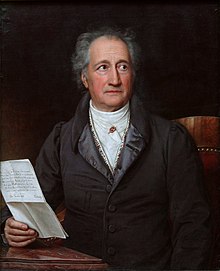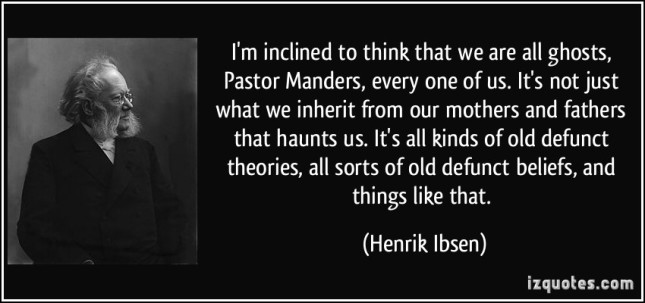Icarus
Icarus is referenced in a framed picture on the wall on the first page of the text (p. 11).
In Greek mythology, Icarus (the Latin spelling, conventionally adopted in English; Ancient Greek Ἴκαρος, Íkaros, Etruscan: Vikare[1]) is the son of the master craftsman Daedalus, the creator of the Labyrinth. Often depicted in art, Icarus and his father attempt to escape from Crete by means of wings that his father constructed from feathers and wax. Icarus' father warns him first of complacency and then of hubris, asking that he fly neither too low nor too high, so the sea's dampness would not clog his wings or the sun's heat melt them. Icarus ignored his father's instructions not to fly too close to the sun, when the wax in his wings melted and he fell into the sea. This tragic theme of failure at the hands of hubris contains similarities to that of Phaëthon. (Source: Wikipedia)

Jacob Peter Gowy's The flight of Icarus.
Ghosts by Henrik Ibsen
The Sorcerer's Apprentice

Illustration from around 1882 by F. Barth (Wikipedia)
"The Sorcerer's Apprentice" (German: Der Zauberlehrling) is a poem by Goethe written in 1797. The poem is a ballad in fourteen stanzas.
The poem begins as an old sorcerer departs his workshop, leaving his apprentice with chores to perform. Tired of fetching water by pail, the apprentice enchants a broom to do the work for him – using magic in which he is not yet fully trained. The floor is soon awash with water, and the apprentice realizes that he cannot stop the broom because he does not know how.
The apprentice splits the broom in two with an axe – but each of the pieces becomes a whole new broom that takes up a pail and continues fetching water, now at twice the speed. When all seems lost, the old sorcerer returns and quickly breaks the spell. The poem finishes with the old sorcerer's statement that powerful spirits should only be called by the master himself.
Read Goethe's poem in German alongside an English translation.
The animated 1940 Disney film Fantasia popularized the story from Goethe's poem, and the Paul Dukas symphonic poem based on it, in one of eight animated shorts based on classical music. In the piece, which retains the title "The Sorcerer's Apprentice, Mickey Mouse plays the apprentice, and the story follows Goethe's original closely, except that the sorcerer ("Yen Sid", or Disney backwards) is stern and angry with his apprentice when he saves him. Fantasia popularized Goethe's story to a worldwide audience. The segment proved so popular that it was repeated, in its original form, in the sequel Fantasia 2000 (Wikipedia)

Sturm und Drang, (German: “Storm and Stress”), German literary movement of the late 18th century that exalted nature, feeling, and human individualism and sought to overthrow the Enlightenment cult of Rationalism. Goethe and Schiller began their careers as prominent members of the movement. Sturm und Drang was intimately associated with the young Goethe. The dramatic literature of the Sturm und Drang was its most characteristic product. Indeed, the very name of the movement was borrowed from a play by Friedrich von Klinger, who had been inspired by the desire to present on the stage figures of Shakespearean grandeur, subordinating structural considerations to character and rejecting the conventions of French Neoclassicism.
Self-discipline was not a tenet of the Sturm und Drang, and the movement soon exhausted itself. Its two most gifted representatives, Goethe and Schiller, went on to produce great works that formed the body and soul of German classical literature. (Source: Encyclopedia Britannica)
Aeschlylus: The Eumenides - summary and analysis
Oresteia - summary
Fathers and Sons by Ivan Turgenev
Fathers and Sons (Russian: Отцы и дети Ottsy i dety, IPA: [ɐˈtsɨ i ˈdʲetʲi]; archaic spelling Отцы и дѣти), also translated more literally as Fathers and Children, is an 1862 novel by Ivan Turgenev, and vies with A Nest of Gentlefolk for the repute of being his best novel. (Source: Wikipedia)

Gilbert and Sullivan - comic opera
Russell's grandfather, who was prime minister, sings "For he is an Englishman" from the comic opera by Gilbert and Sullivan, "H.M.S. Pinafore". Here are the lyrics to the song.
The Battle of the Greek Tragedies
The world of modern theater owes its roots to the tragedians of Ancient Greece. As far back as the 5th Century BCE, actors and playwrights were entertaining the masses with intriguing stories. Melanie Sirof unveils the ancient theatrical innovations that made the way for Broadway.
Oresteia: Eumenides (The Furies) by Aeschylus
World turtle

Page 112
The World Turtle (also referred to as the Cosmic Turtle, the World-Bearing Turtle, or the Divine Turtle) is a mytheme of a giant turtle (or tortoise) supporting or containing the world. The mytheme, which is similar to that of the World Elephant and World Serpent, occurs in Chinese mythology and the mythology of the Indigenous Peoples of the Americas. (Source: Wikipedia)

An 1876 drawing of the world supported on the backs of four elephants, themselves resting on the back of a turtle. (Source: Wikipedia)
Read more about the World Turtle and see interesting illustrations.
